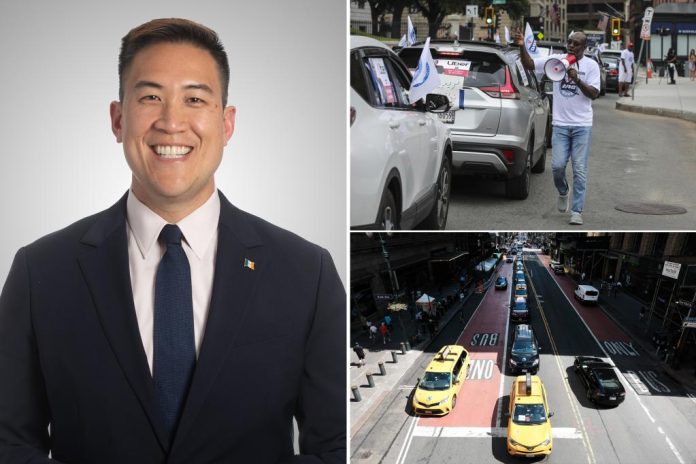New York’s proposed congestion toll on vehicles entering Manhattan below 60th Street will have a “big impact” on the city’s taxi and for-hire vehicle industry, Taxi and Limousine Commission Chair David Do warned Thursday.
Testifying at a City Council hearing on the future of the city’s once-ubiquitous yellow cabs, Do said some studies have shown how vulnerable they are.
“There’s going to be a big impact,” he said. “Some studies have said there would be a decline in trips of more than 5%. This is a big concern.”
Passed in 2019, the MTA’s congestion pricing program aims to reduce overall traffic in Manhattan’s downtown by charging anywhere from $9 to $23.
Several of the pricing schemes floated as part of the MTA’s environmental review of the proposal would dent revenues in the immigrant-dominated for-hire industry, and the MTA is warning some drivers may be out of work as a result.
Drivers are outstanding. The number of yellow cabs on the road has dropped dramatically since the COVID-19 pandemic, and drivers worry the new toll could be the “final nail in the coffin.”
“As we struggled to get back on our feet, we face the very real threat of an additional congestion tax on our fares,” Independent Drivers Guild organizing director Aziz Bah testified Thursday. “While passengers may be charged the additional surcharges, it is the drivers who will ultimately pay in significantly fewer trips and lower compensation.”
Independent Drivers Guild organizer Aziz Bah, who works as an Uber driver, at a demonstration in Boston.Boston Globe via Getty Images
 TLC Chair David Do.NYC TLC
TLC Chair David Do.NYC TLC
For-hire cars have already paid a $2.75-per-ride congestion fee since 2019, which goes to the MTA, Bah said — echoing a point made by industry experts including Do.
“Our for-hire vehicles and taxis have paid almost $2 billion to the MTA in congestion charges,” Do council members told.
A panel known as the Traffic Mobility Review Board — whose members are appointed by the mayor and governor — will ultimately set the final toll amount, approve any exemptions and determine whether and how to charge for-hire drivers.
“As the Traffic Mobility Review Board looks at this, I urge them to look at the contributions that the for-hire vehicle industry as a whole has already contributed to the MTA,” Do said.
The MTA’s plan is subject to change, but is required by law to raise $1 billion per year.
In a statement, the MTA said its great schemes that could put drivers out of work were among “different scenarios … modeled as part of the federal environmental review process, with different outcomes for taxi drivers and others.”
“If the program is approved by the Federal Highway Administration, the Traffic Mobility Review Board will review all available material to make recommendations on what the policy could be,” said MTA’s chief of external relations, John McCarthy.
“What’s beyond doubt is that an often-gridlocked Central Business District will have tens of thousands of fewer vehicles every weekday, enabling dramatic air quality improvements and ensuring that ambulances, fire trucks, buses, e-commerce delivery vans and other vehicles necessary to our city’s viability can move around.”

